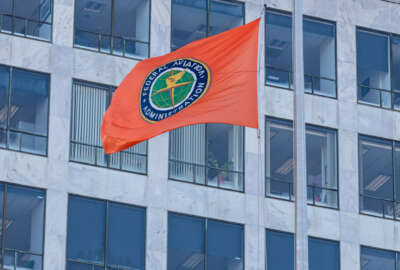Senators frustrated by FAA nominee’s lack of specifics about delayed safety provisions
Acting administrator Michael Huerta had few answers for members of the Commerce, Science and Transportation Committee concerning the FAA's lack of progress on pilot...
wfedstaff | April 17, 2015 3:53 pm
By Keith BieryGolick
and Jared Serbu
DoD Reporter
The Senate Commerce, Science and Transportation Committee put Michael Huerta, the prospective administrator of the Federal Aviation Administration, under pressure regarding slow rule-making during a nomination hearing Thursday.
Huerta, the former deputy administrator, has been serving as acting administrator since previous chief Randy Babbitt resigned after a drunken driving arrest last December. The court later dismissed the charges against Babbitt.
Babbitt’s tenure ended inauspiciously and Huerta’s nomination hearing got off to a similar start when he confused President Obama with former President Clinton in his testimony. “It’s an honor to appear before you today as President Clinton’s nominee for administrator of the Federal Aviation Administration,” he said. Huerta held a senior policy position at the U.S. Department of Transportation under then-President Clinton. 
“We continue to work on a final rule to update our commercial pilot training requirements,” he said. “I’ve made it a very high personnel priority to do all we can to expedite the development of this rule.”
Congress mandated the pilot training rule in 2010 in response to the controversy surrounding the Colgan Air crash a year earlier, giving the FAA an original deadline of October 2011. Due to a huge amount of comments, the FAA doesn’t expect to finalize the rule until October 2013, Huerta said.
“What we are doing is working through a large number of comments and ensuring that we can develop a rule that will stand the test of time and that will deliver on the benefits that we want to do,” he said.
Frustration over answers grows
Sen. John Rockefeller (D-W.Va.), chairman of the committee, pressed Huerta about answering his fellow senator’s questions with what he said appeared to be scripted Office of Management and Budget replies.
“I’m sort of aghast here,” Rockefeller said. “I just can’t live with ‘I’m going to do everything I can.’ I want to know what it is that you will do to make sure it will happen.”
Huerta said regular meetings with FAA’s safety organization about legal and resource issues they are facing have helped.
“Mr. Chairman, once a week I meet with our safety organization on a regular basis and we go over every rule that we have pending,” he said. “It creates a forum for us to work through what are very complex issues. I share your frustration; I want this to be done quickly.”
Sen. Frank Lautenberg (D-N.J.) quickly sprang to Huerta’s defense.
“You’re getting some pressures here for things that I really don’t think are justified,” he said. “It has to recognized that you’re not responsible for the delay, but you will be responsible for the management of where we go.”
Senators also wanted to know about FAA’s progress toward building the NextGen air traffic control system, which will replace radar and radio technology with a framework based on satellite navigation and digital data.
An April report by the Department of Transportation’s inspector general found FAA had not come up with cost, schedule or performance baselines for any the six foundational technologies that will form the basis for NextGen. The IG also found the agency’s implementation of the system has been hampered because the FAA hasn’t finalized its requirements for the major systems.
NextGen progress made
Huerta told lawmakers the FAA has made progress since then.
“Three of those have been baselined, and we’re on track to meet our commitments in those baselines,” he said. “But we’re trying to mitigate risk based on developing the appropriate levels of information so that we know what we’re getting into before we establish the baselines. We’re very focused on delivering benefit and hitting our targets.”
Huerta didn’t say when the FAA would establish targets for the other three programs. But he said the agency told the aviation industry it would get certain technologies up and running soon, including a major program known as Automated Dependent Surveillance Broadcast (ADS-B).
“We made a commitment to the industry that it would be deployed throughout the country by 2013, and we’re on track to deliver on that,” he said. “What that gives a pilot is much greater situational awareness. It gives us a very precise view of what’s happening in the airspace system. Later this summer, we’ll also take a first step in our data communications program. DataCom is a transformational technology, because what it addresses head-on is one of our principle challenges, which is making sure our communications between controllers and pilots are accurate, precise and delivered in a timely fashion. We’re on track for beginning the delivery of that program later this year.”
Nonetheless, the overall NextGen program will take a long time to fully bear its promised fruit. Huerta said the program already has milestones stretching all the way out to 2025.
The hearing also addressed whistleblower complaints about safety issues within the FAA. A report to the White House and Congress last month by the Office of Special Counsel found that FAA had one of the highest rates of whistleblower complaints among federal agencies, and that most of the complaints were deemed to have merit — 50 percent, compared to a governmentwide rate of 5 percent.
Huerta said for the past two years, the agency has been trying to build a climate that encourages employees to come forward when they spot safety problems, including the establishment of a dedicated whistleblower office.
“We actually set it up with the assistance of a former FAA whistleblower,” he said. “We wanted to make sure it was clear where people can go if they have concerns about safety. It’s done a lot to create an environment and quick response. In one instance, we completely changed out the management of a facility so that we could ensure an appropriate focus was being given to safety.”
However, auditors reported that several of the whistleblowers were repeat visitors to the Office of Special Counsel, telling the independent agency that FAA had failed to remedy safety problems even after they were reported to managers. Special Counsel Carolyn Lerner told the White House and Congress that FAA did not promptly respond to several safety concerns agency whistleblowers had highlighted.
Keith BieryGolick is an intern at Federal News Radio
RELATED STORIES:
Obama taps acting FAA chief to officially head agency
FAA wants to boost airline pilot qualifications
FAA issues rules to prevent tired airline pilots
Copyright © 2025 Federal News Network. All rights reserved. This website is not intended for users located within the European Economic Area.





